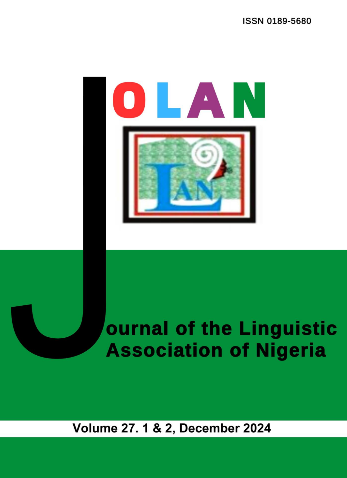Igbo-English Bilinguals’ Performance in Passive Constructions in English and Its Implications for National Development
Keywords:
passive constructions, Minimalist Program, movement, national developmentAbstract
This paper investigates Igbo English bilinguals’ performance in passive constructions. Three hundred subjects drawn from three tertiary institutions in Abia and Imo States formed the population. Data were elicited from the subjects through a structured written test labelled ‘Grammaticality Judgement’ which required the subjects to identify passive sentences that best transformed given active voice sentences. The study adopted two theoretical approaches, namely Error Analysis (EA) and Chomsky’s Minimalist Program (MP). Data collected were analysed at the two levels of computational system, as discussed in Minimalism, namely, Phonetic Form (PF) and Logical Form (LF). Findings from data analysis reveal that over 35% of the subjects were unable to identify passive sentences that best transformed the active voice sentences given as test questions. The research, therefore, concludes that greater percent of Igbo-English bilinguals are competent in the language of wider communication and consequently will be able to participate effectively in the national development programmes. The paper recommends that serious attention be paid to teaching of English tenses as findings reveal that the verb category posed serious syntactic difficulty for the subjects.
References
Adger, D. (2003). Core syntax: A minimalist approach. Oxford: Oxford University Press
Carnie, A. (2007). Syntax: A generative introduction.2nd Edition. Malden, MA: Blackwell Publishing,
Carnie, A. (2011). Modern syntax: A course book. New York: Cambridge University Press.
Chukwu, E. and Osuala, I. (2016). Employability, Nigeria graduates and English for occupational purposes. A paper presented at the 3rd national conference of the School of General Studies, Abia State Polytechnic, Aba, held at ABIAPOLY pavilion, 2nd – 5th August, 2016.
Corder, P. S. (1981). Error analysis and interlanguage. University Press, Oxford, New York, 125p.
Cook, V.J. and Newson, M. (2007). Chomsky’s universal grammar: An introduction. 3rd Edition. Blackwell Publishing, Malden, MA, 326p.
Ikoro, O.S. (2017). Employability of the Nigerian Youth in the Global Economy: The place of the English language. ABIAPOLY Journal of General Studies. Vol.1 (1), pp.37-49.
Obiegbu, I. (2015). The English language and sustainable development in Nigeria. Open Journal of Political Science, 5, 82-86. Accessed on 30th July, 2018 from http://dx.doi.org/10.4236/ojp.2015
Onukaogu, A.A., Okpara, O., Anyanwu, I. and Onyerionwu, E. (2011). Communication and national development: Fundamentals and application. Aba: Literaseed
Radford, A. (2004). English syntax: An introduction. Cambridge: Cambridge University Press.
Tellerman, M. (2011). Understanding syntax (3rd edition). UK: Hodder Education
Tomori, S.H.O. (2004). The morphology and syntax of present-day English. An introduction. Ibadan: Heinemann Education Books.
Uzoma, A. P. (2016). Language, a vehicle for sustainable development in the 21st century. Humanity and Social Science Journal, vol.11 (1), pp.8-12














